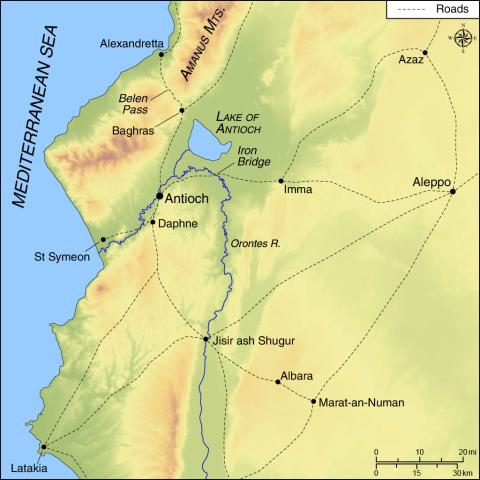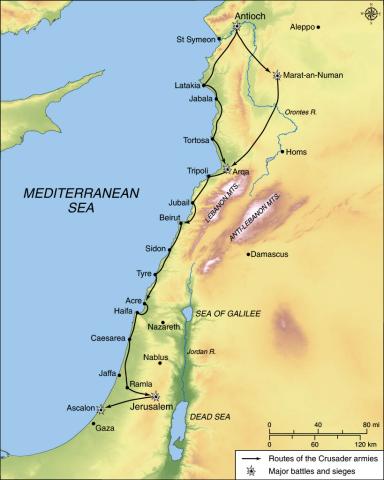The March to Jerusalem
[10.30.4] Reversī sunt itaque, hōc perāctō, nostrī Francī cum magnō gaudiō ad prius castrum. Tertiā vērō diē exiērunt et vēnērunt ad quamdam urbem cui nōmen Marra, quae illīc erat prope illōs. Erant autem ibi multī Turcī congregātī, et Saracēnī ab Aleph cīvitāte et ab omnibus urbibus et castrīs quae circā illam sunt. Exiērunt ergō barbarī contrā illōs ad bellum, nostrīque, aestimantēs luctārī cum illīs, proeliandō coēgērunt eōs in fugam; et tamen reversī per tōtum diem invādēbant nostrōs adinvicem, et usque ad vesperam perdūrāvit illa invāsiō. Aestus namque erat immēnsus. Nequībant iam nostrī sufferre tantam sitim, quoniam nullātenus ibi ad bibendum invenīre aquam poterant; voluērunt tamen ad illōrum castrum sēcūrē redīre. Prō illōrum enim peccātīs Syriānī et minūta gēns, nimiō pavōre correptī, mox coepērunt viam carpere retrōrsum. Ut autem Turcī vīdērunt illōs retrōcēdentēs, statim coepērunt illōs persequī, et victōria illīs ministrābat vīrēs. Multī namque ex ipsīs reddidērunt animās Deō, cūius amōre illīc congregātī fuerant. Haec occīsiō facta est quīntō diē in mēnse Iūliō. Reversī sunt autem Francī illī quī remānserant in suum castrum; et fuit ibi Raimundus cum suā gente per plūrēs diēs.
notes
(July 1094) Raymond Pillet's contingent comes to Marra, and its Turkish army comes out to fight. Each side has some success, but in the end many crusaders died.
Marra: now Maarat al-Numan (Marat-an-Numan) in northern Syria, referred to as castrum in the previous chapter.
Aleph: Aleppo, in northern Syria.
contrā illōs: against the Christians.
cum illīs ... eōs: = cum barbarīs ... barbarōs.
reversī: = (barbarī) reversī.
Prō illōrum enim peccātīs: “because of their sins.”
Nequībant iam nostrī sufferre tantam sitim ... voluērunt tamen ... redīre: tamen here seems to mean "accordingly," "so" (ML).
minūta gēns: “the little people,” i.e., the poor.
victōria illīs ministrābat vīrēs: i.e., the Turks were emboldened by their success.
cūius amōre: “for the sake of whose love”
quīntō diē in mēnse Iūliō: the date was actually July 27, 1098 (Dass).
vocabulary
peragō peragere perēgī perāctum: to thrust through, to go through with, to relate
aestimō (1): to determine the value of something; to weigh, hold (CL); to decide (ML)
lūctor (1): (dep.) to wrestle, struggle
proelior (1): to engage in battle
adinvicem: by turns, mutually
perdurō (1): to last, to endure
aestus –ūs, m.: agitation, glow, heat
nequeō nequīre nequiī (nequīvī) nequitum: to be unable
sitis –is, f.: thirst
nullātenus: by no means
sēcūrē: safely
pavor –ōris, m.: trembling, fear, alarm
corripiō corripere corripuī correptum: to seize, snatch up
retrōrsum: back, backward
retrōcēdō retrōcēdere retrōcēssī retrōcessum: to go back, recede
ministrō (1): to attend, wait upon, serve (CL); to give, afford (ML)
occisiō –ōnis, f.: slaughter


